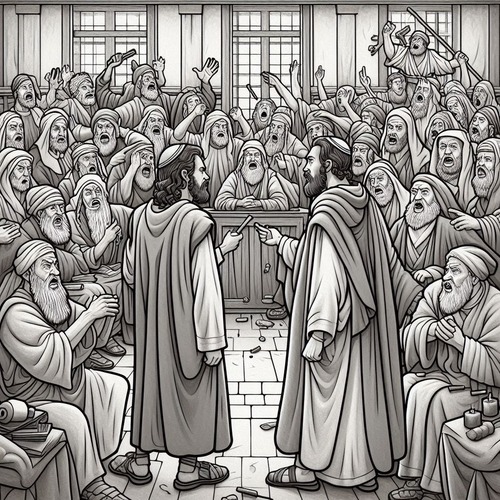Faithful to the Pattern: Why Paul Reserves Ordination for Men
Few topics in contemporary Christianity generate more tension than women’s ordination. This question touches real lives, genuine callings, and deeply held convictions. We’ve all known godly, gifted women whose wisdom and biblical insight surpass many men in leadership. So why would Scripture restrict certain church offices to men?
This isn’t about cultural prejudice or female inferiority. It’s about faithful submission to Scripture’s pattern, even when that pattern challenges our instincts. Let’s explore why the Reformed tradition has historically understood Paul’s restriction as binding for the church today.
UNDERSTANDING THE DEBATE
Before diving into Scripture, we need to understand the landscape. Two main positions dominate this conversation:
- Egalitarians believe men and women should have equal access to all church roles, including ordination as pastors and elders. They argue restrictive passages reflected temporary cultural conditions in the ancient world and that Galatians 3:28—“there is neither male nor female… in Christ Jesus”—abolishes gender-based role distinctions in the church.
- Complementarians believe men and women are equal in worth but distinct in role. While affirming women’s full dignity, giftedness, and participation in ministry, complementarians hold Scripture reserves the governing and teaching office of elder specifically for qualified men. This isn’t about superiority but about God’s design for how authority and representation function in His covenant community.
Both sides affirm women as image-bearers and co-heirs with men in salvation. The disagreement centres on whether certain church offices are gender-specific by divine design.
WHAT DO WE MEAN BY ORDINATION?
Ordination is the church’s formal recognition and setting apart of someone to the office of elder (also called pastor, overseer, or teaching elder). This office carries the authority to teach Scripture authoritatively to the whole congregation, to govern the church, and to guard its doctrine. Ordination isn’t about who can speak, serve, teach children, lead Bible studies, or exercise spiritual gifts—it’s specifically about who holds the office that represents Christ’s authority to shepherd His flock.
This distinction matters: giftedness isn’t the same as office. A woman may be extraordinarily gifted in biblical knowledge and teaching, but complementarians argue giftedness alone doesn’t authorise someone to hold an office that Scripture reserves for qualified men.
PAUL’S CLEAR INSTRUCTIONS
The apostle Paul addresses this question directly in two key passages:
In 1 Timothy 2:11-14, Paul writes: “Let a woman learn quietly with all submissiveness. I do not permit a woman to teach or to exercise authority over a man; rather, she is to remain quiet. For Adam was formed first, then Eve; and Adam was not deceived, but the woman was deceived.”
Similarly, in 1 Corinthians 14:34-35, Paul instructs women should “remain silent in the churches” regarding the evaluation of prophetic teaching, and “if there is anything they desire to learn, let them ask their husbands at home.”
These aren’t isolated verses but consistent apostolic instruction given to different churches facing different circumstances. The restriction is specific: women should not teach Scripture with authority over men in the assembled church or govern as elders. This doesn’t prohibit all speaking, praying, prophesying, or ministry—it addresses the particular office of teaching elder.
What exactly does the teaching elder role involve? The pulpit ministry represents the exercise of elder authority that Paul reserves for qualified men. The elder exercises ongoing authority to interpret and apply Scripture authoritatively to the whole congregation—what we traditionally call preaching or expository teaching in the gathered worship service. This is distinct from sharing a testimony, reading Scripture aloud, leading worship, or even teaching in other contexts like Sunday school classes. When complementarians say women can “speak,” they mean women can pray aloud, share insights, prophesy (in the 1 Corinthians 11 sense), and participate vocally in appropriate settings. Typically, they reserve the sermon and application of God’s Word to the teaching elder.
THE FOUNDATION: CREATION, NOT CULTURE
Here’s what makes Paul’s argument decisive: his instruction is rooted in creation, not culture. Notice Paul doesn’t appeal to Roman customs, Jewish traditions, or the particular problems in Ephesus. Instead, he reaches back to Genesis, to the garden before the Fall, to the order of creation itself.
Paul grounds his instruction in two creation realities: “Adam was formed first, then Eve” (the order of creation), and the distinct roles each played in the Fall. This matters tremendously. If Paul were merely accommodating first-century culture, we could dismiss his teaching as temporary. But by anchoring it in creation, Paul signals this reflects God’s permanent design for how authority and representation work in His people.
Throughout Scripture, we see this pattern:
- God chose a male priesthood in Israel.
- Jesus selected 12 men as apostles, even though women like Mary Magdalene were devoted followers.
The consistent pattern of male leadership in God’s covenant communities points to something deeper than cultural accident.
This is complementarity: men and women are designed to fit together, bringing distinct contributions to God’s purposes. Just as male headship in marriage reflects Christ’s relationship to the church (Ephesians 5:22-33), so male eldership reflects Christ’s headship over His people. The office is representation, not privilege—elders represent Christ’s authority as under-shepherds, and God has chosen to picture that authority through qualified men.
ANSWERING COMMON OBJECTIONS
- “What about Deborah, Priscilla, Phoebe, and other women leaders in Scripture?” These women exercised vital ministries, but not the office of elder. Priscilla taught Apollos privately alongside her husband (Acts 18:26). Phoebe served as a deacon (Romans 16:1), a role many complementarians affirm for women. Deborah’s unique role as judge actually underscores the point—the text presents her leadership as exceptional, arising during a period when “there was no king in Israel.” These examples show women’s giftedness and service without contradicting the eldership pattern.
- “Isn’t Paul just reflecting his patriarchal culture?” If cultural accommodation were Paul’s goal, why does he appeal to creation rather than contemporary customs? In fact, Paul’s teachings elevated women far above Greco-Roman norms—affirming their worth, encouraging their learning, treating them as co-heirs in Christ. The cultural argument cuts both ways: once we dismiss Paul’s teaching as merely cultural, we lose any stable ground for biblical authority. Who decides which commands transcend culture and which don’t?
- “Doesn’t Galatians 3:28 eliminate gender distinctions?” “There is neither Jew nor Greek, slave nor free, male nor female, for you are all one in Christ Jesus.” This glorious text speaks to our equal standing before God in salvation, not to role distinctions in church office. Paul wrote both Galatians 3:28 and 1 Timothy 2:12—he saw no contradiction. Unity in Christ doesn’t erase functional distinctions any more than it immediately abolished slavery or ethnic differences in Paul’s day.
THE REFORMED WITNESS
The Reformed tradition has consistently upheld this position. The Westminster Confession, the Three Forms of Unity, and the teaching of luminaries from Calvin to Edwards to Spurgeon all affirmed male-only ordination. This wasn’t cultural blindness but submission to sola Scriptura—letting Scripture speak even when it confronts our assumptions.
Reformed theology takes seriously the sufficiency and authority of God’s Word. When Scripture speaks clearly and grounds its commands in creation, we trust God’s wisdom rather than revising His Word to match contemporary sensibilities.
A PASTORAL CONCLUSION
Let’s be clear: this position honours rather than diminishes women. Women’s ministries in the church remain vast and vital—teaching other women and children, serving in missions, writing, counselling, mercy ministries, exercising spiritual gifts, and prophesying (Acts 2:17). The restriction is narrow: the specific office of elder that carries governing and teaching authority over the assembled church.
Giftedness is not the same as office. A gifted teacher isn’t automatically called to be an elder any more than a generous giver is automatically called to be a deacon. God distributes gifts freely, but He also establishes order for how those gifts serve His church.
This is a call to humility for all of us. In an age that prizes autonomy and self-determination, submission to Scripture’s pattern is countercultural. But God’s design is always for our flourishing and His glory. When we trust His wisdom in creation and redemption, we can trust His wisdom in ordering His church.
The office of elder is representation, not privilege—a calling to servant leadership that reflects Christ’s own headship. By faithfully maintaining this pattern, we honour not only Scripture’s teaching but also the God who gave it, trusting His ways are higher and better than our own.
WHY PAUL RESERVES ORDINATION FOR MEN: RELATED FAQs
How are women to view their roles in ministry outside of ordination? Elisabeth Elliot, a prominent complementarian missionary and author, emphasised women can have profound influence through teaching other women, writing, and evangelism without holding ordained positions. She saw this as a joyful fulfillment of Titus 2:3-5. She believed submission to biblical roles freed her to focus on her unique calling, such as mentoring and speaking on suffering and faith. This perspective highlights how complementarianism empowers women to thrive in non-authoritative spheres, fostering deep spiritual impact.
- What does joyful submission look like for women in modern church settings? Complementarian women often describe joyful submission as a voluntary embrace of God’s design, where they find freedom in supporting male leadership while excelling in roles like discipleship, hospitality, and mercy ministries. For instance, authors like Nancy DeMoss Wolgemuth share how this yields personal growth and church harmony, viewing it as mirroring Christ’s submission to the Father. It’s not about suppression but about delighting in complementary partnerships that reflect divine order.
- How have women contributed to theology even without ordained roles? Women like Dorothy Patterson, co-editor of “Recovering Biblical Manhood and Womanhood,” have shaped complementarian theology through writing and teaching seminars for women, joyfully affirming Paul’s instructions as protective and liberating. They argue such contributions enrich the church without overstepping authority boundaries, allowing for robust intellectual engagement. This demonstrates the Reformed tradition’s value for women’s voices in non-preaching capacities.
Why do some women see Paul’s restriction as a gift rather than a limitation? Many view it as a divine gift that protects women from the burdens of pastoral authority, enabling them to focus on relational and nurturing ministries where they often excel. Figures like Mary Kassian express joy in this framework, seeing it as an opportunity to model humility and interdependence in the body of Christ. Ultimately, it fosters a sense of peace, knowing their service aligns with creation’s intentional design.
- How do women address feelings of calling to ministry in light of Paul’s teaching? They often redirect such callings to biblically permissible avenues, like leading women’s Bible studies or missions work, finding fulfillment in these without ordination. Women such as Jen Wilkin encourage discerning gifts through community affirmation, joyfully submitting to Scripture as the ultimate guide. This approach transforms potential frustration into purposeful service, honouring Paul’s wisdom.
- What role do complementarian women play in family and church complementarity? In families, they model submission that strengthens marriages, as per Ephesians 5, which spills over into church life by supporting elders through prayer and counsel. Authors like Susan Hunt describe this as a joyful cycle where women’s influence builds up the congregation indirectly but powerfully. It underscores the Reformed emphasis on covenantal relationships, where every member thrives in their God-given role.
How are women to interpret and apply Titus 2:3-5 in their lives? Complementarian women interpret Titus 2:3-5 as a call for older women to mentor younger women in godliness, purity, and domestic faithfulness, seeing it as a vital ministry that strengthens the church. They apply it by leading women’s Bible studies, discipling younger believers, and modelling Christlike character, as exemplified by figures like Susan Hunt who emphasise nurturing covenant communities. This passage inspires joyful service, equipping women to shape families and churches without assuming authoritative roles.
WHY PAUL RESERVES ORDINATION FOR MEN: OUR RELATED POSTS
Editor's Pick

Paul’s Mandate for Men: Headship Or Servant Leadership? Or Both?
Modern Christianity has fallen into a trap. We've created an either/or battle between "headship" and "servant leadership," as if these [...]

Should We Stop Using Male Pronouns for God? Why Do We Say No?
A friend of ours arrived eagerly at his first theology class in seminary. But he quickly discovered something troubling: the [...]

Did Old Testament Law Force Women to Marry their Rapists?
**Editor’s Note: This post is part of our series, ‘Satan’s Lies: Common Deceptions in the Church Today’… Viral misinformation abounds [...]

From Danvers To Nashville: Two Statements, One Biblical Vision
30 years separate the Danvers Statement on Biblical Manhood and Womanhood (1987) and the Nashville Statement on Human Sexuality (2017). [...]

The Nashville Statement: Why Affirm It Despite Media Backlash?
WHY DO REFORMED CHRISTIANS STAND BY THIS STATEMENT ON MARRIAGE AND GENDER? When the Nashville Statement was released in 2017, [...]

Who Is Belial? Solving The 2 Corinthians 6:15 Mystery
Belial: This name from the pages of Scripture chills the soul. Who is this mysterious figure Paul invokes in 2 [...]

Celibacy Or Castration: What Jesus Really Means in Matthew 19:12
One of Scripture's most shocking misinterpretations led theologian Origen to castrate himself in the third century. His tragic mistake? Taking [...]

Philippians 4:13: Did Paul Really Mean We Can Do ALL Things?
"I can do all things through Christ who strengthens me." It's on gym walls, graduation cards, and motivational posters everywhere. [...]

The Ordinary Means of Grace: Why Are They Indispensable?
ORDINARY MEANS FOR EXTRAORDINARY TRANSFORMATION What if God's most powerful work in believers' lives happens through the most ordinary activities? [...]

Is the Bible God’s Word? Or Does It Only Contain God’s Word?
The authority of Scripture stands at the crossroads of modern Christianity. While some argue the Bible merely contains God’s Word [...]
SUPPORT US:
Feel the Holy Spirit's gentle nudge to partner with us?
Donate Online:
Account Name: TRUTHS TO DIE FOR FOUNDATION
Account Number: 10243565459
Bank IFSC: IDFB0043391
Bank Name: IDFC FIRST BANK






